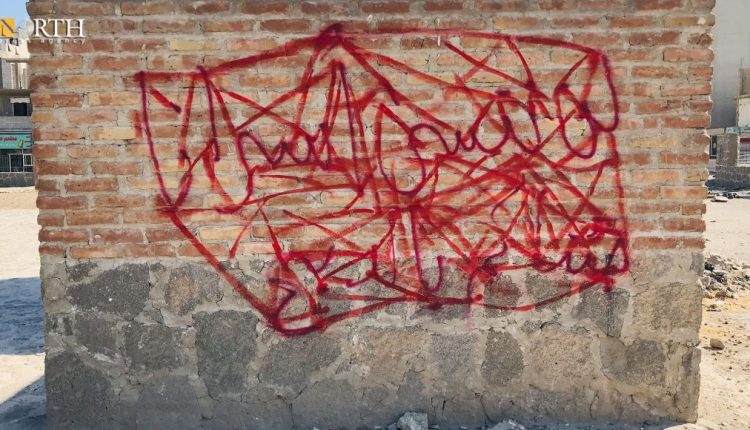
By Zana al-Ali
RAQQA, Syria (North Press) – Raqqa Governorate in northern Syria witnessed a troubling development last week when several foreign detainees affiliated with the Islamic State (ISIS) escaped from a prison run by the Syrian Democratic Forces (SDF).
In the wake of the breakout, ominous slogans linked to ISIS appeared on the walls of a major city park, including messages like “We will not forget our captives” and “Beware of your necks.” These chilling words have fueled speculation about the militant group’s intentions and the broader message it seeks to communicate through such actions.
Sowing fear and intimidation
Rami Abdurrahman, director of the Syrian Observatory for Human Rights (SOHR), said that these graffiti incidents are part of ISIS’ broader strategy to spread fear and remind the public that the group remains an active and formidable threat.
“ISIS uses these tactics to signal that they are still present and capable of striking at any time,” Abdurrahman added.
He believes that the resurgence of such public messaging represents a direct threat to those who oppose the group, as ISIS attempts to cultivate a supportive atmosphere among its sympathizers.
The timing of this incident coincides with a broad security crackdown in Raqqa targeting drug traffickers and criminal gangs, leading some to suspect that ISIS-affiliated elements or even local gangs may be behind the slogans in an effort to sow chaos.
While such messages aim to intimidate, Abdurrahman pointed out that ISIS supporters typically favor surprise attacks over symbolic actions like graffiti.
He also emphasized that despite recent efforts to bolster security, ISIS cells remain capable of conducting small-scale operations, including targeted attacks on prisons.
However, he downplayed the likelihood of another large-scale assault akin to the al-Sina’a prison attack in the Guweiran neighborhood in the city of Hasakah, citing increased security measures in place to prevent a repeat of such incidents.
SOHR director noted to a recent uptick in ISIS activity in northern and eastern Syria, contrasting this with the weakening influence of Iranian-backed militants in the region.
He emphasized that despite their setbacks, ISIS cells continue to hide among civilians, making it extremely difficult for security forces to fully eliminate them.
In a related development, the U.S. Central Command (CENTCOM) announced on Sep. 3 the capture of a senior ISIS leader, believed to be instrumental in facilitating support for members of the group following their escape from the Raqqa prison.
Escalating threats to prisons
Mahmoud Habib, spokesperson for the Northern Democratic Brigade, a military group affiliated with the SDF, warned that ISIS’ actions serve as a clear reminder of the group’s ongoing ambitions.
“ISIS is trying to prove that it remains a force to be reckoned with,” Habib said in a statement to North Press.
He added that the group continues to harbor dreams of reclaiming control over the region, which in the past brought them significant political and economic gains.
Habib believes that ISIS views its prison break operations as a critical first step in reestablishing its foothold in Syria. “Prisons and detention centers are their primary targets because freeing their members is crucial for them to regain strength,” he noted.
Despite multiple attempts to storm prisons since the infamous al-Sina’a prison attack, Habib confirmed that all of ISIS’ recent efforts have been thwarted, thanks to enhanced security measures by the SDF and other security forces.
However, he cautioned that the situation remains tense, requiring continued vigilance and cooperation from regional and international partners to prevent further breaches.
Habib also highlighted an alarming rise in ISIS activity in 2024 compared to previous years, attributing the surge to several factors, including external financial and military support, allegedly from Turkey, and the deterioration of security along the Iraq-Syria border.
He criticized the Syrian government’s weak control over the vast Syrian Desert and accused Turkish intelligence of facilitating the smuggling of militants in and out of the region.
